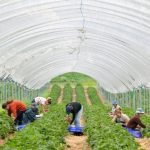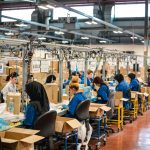Take a look at some of our key achievements:

1. Labour Migration
We have significantly increased understanding of the impact of the UK’s immigration system on workers and risk of exploitation by providing Government and key stakeholders with evidence-based research, analysis and recommendations.
We have had active ongoing engagement with the Home Office on the transition following the end of free movement and the post-Brexit immigration system and helped achieve the removal of fees for settled and pre-settled applications to the Scheme, benefiting 3.5 million EU nationals and their families.
In 2018, we gave expert evidence to the Public Bill Committee on the 2019 Immigration Bill, highlighting the risks posed to workers under post-Brexit immigration plans. The then Home Secretary confirmed that anti-exploitation concerns would be considered in the design and evaluation of the Seasonal Workers Pilot scheme. More recently, FLEX’s research findings on the Seasonal Worker Scheme prompted the Scottish Government to establish an independent helpline for agricultural workers, to maintain up-to-date informative tools for workers, to work with local authorities to increase caravan inspections on farm sites, and to commit to strengthening relevant legislation. The UK Government updated its guidance for the scheme, banned the use of zero-hour contracts, and introduced a minimum wage for seasonal workers.
The Migration Advisory Committee (MAC)’s 2022 annual report includes a chapter on risk of exploitation arising from immigration policy, representing an important commitment to considering the Government’s power to prevent or drive exploitation when issuing immigration policy recommendations, a key preventative measure FLEX has been advocating for tirelessly for many years.

2. Workers’ Rights
We have contributed to recognition of the central role of labour inspection and the enforcement of labour standards in protecting workers from exploitation through our research and advocacy, prompting both enforcement agencies and industry to develop initiatives focusing on high-risk sectors.
We have worked closely with the UK Director of Labour Market Enforcement (DLME) to promote the enforcement of labour rights and standards as part of Government’s response to labour exploitation. Former Directors have adopted key recommendations made by FLEX in their annual strategies, with the DLME’s annual strategies for 2020/21 and 2021/22 referencing our work when highlighting the intersection between immigration policy and risk of labour exploitation for the first time.

3. Reporting Abuse
We have engaged with key national and international stakeholders on the need to introduce secure reporting mechanisms to ensure that all workers are able to report labour abuse without fear of facing immigration enforcement action, and published a briefing and a practical guide for police and labour inspectors to take proactive steps towards its implementation.
Our parliamentary work around the Nationality and Borders Bill helped inform Peers and garnered significant support around the importance of introducing secure reporting mechanisms to prevent exploitation and abuse.

4. Structural Inequalities
We have worked with partners to highlight specific workplace risks and gender-related abuses that can put women workers at risk of exploitation, including the gap in enforcement on sexual harassment protections. We have also advocated for practical steps labour market enforcement agencies can take to build more targeted, gender-aware responses to abuse and exploitation of women in the workplace.
We worked with the Greater London Authority (GLA) and partner organisations to provide support and information for workers during COVID-19 as well as publishing a report raising awareness of the impact of structural inequalities on risk of exploitation as a result of COVID-19.

5. Worker-Informed Policies
We have been at the forefront of developing innovative participatory research methodologies engaging migrant communities and workers from high-risk sectors in research and advocacy as paid peer researchers, and have supported others to adopt this methodology. We published three reports using this approach with a particular focus on the experiences of women workers and young people in cleaning, hospitality, and app-based deliveries, as well as a guide on lessons learned from using Feminist Participatory Action Research with workers in high-risk sectors.

6. Supply Chains
As a result of our advocacy with partners on Section 54 of the UK Modern Slavery Act 2015, the Government committed to creating a state-run registry for corporate modern slavery statements. We also established a network of NGOs through which we worked collectively to achieve the inclusion of a more meaningful ‘Transparency in Supply Chains’ reporting requirement for companies in legislation.
Through high-level engagement with the Greater London Assembly (GLA), we advised on the development of their ethical procurement policies and contributed to the establishment of the Modern Slavery Partnership Board.

7. High-Risk Sectors
We have been at the forefront of conducting research into labour exploitation in high-risk, under-researched sectors of the economy such as such as agriculture, care, cleaning, gig economy, hospitality and construction.
In 2021 alone, our research projects engaged 626 workers from under-researched high-risk sectors, while we increased the capacity of our partners to deliver information and advice, resulting in 643 workers supported.

8. Human trafficking for labour exploitation
We have become a leading voice in policy and practice to prevent human trafficking for labour exploitation in the UK through strong engagement with the development of the UK Modern Slavery Act 2015.
We established a platform for network engagement with the Independent Anti-Slavery Commissioner, whose role we advocated for during the process leading to the Modern Slavery Bill on behalf of the Labour Exploitation Advisory Group (LEAG), to ensure that the office is directly informed by frontline services and our collective strategic priorities, and that there are engagement mechanisms for receiving input from civil society.
We were instrumental in helping to reinstate financial support for victims of trafficking and the Government was ordered to make a £1 million back payment for 1,200 victims of trafficking.

9. Capacity-building
Through our first training programme with frontline organisations working with migrant communities, we conducted capacity-building activities with 382 frontline workers, 96% of whom expressed feeling more confident to identify potential victims of labour exploitation/modern slavery.
Since expanding our training programme in 2021 to provide bespoke training for statutory bodies and frontline organisations supporting workers and communities represented in at-risk sectors, we have trained 96 officials from 31 local authorities in London, 35 Metropolitan police officers, and 66 staff members and volunteers from 27 different supporting organisations working in London, Birmingham, Edinburgh and Manchester, with overwhelmingly positive feedback.

10. Coalition-building
We have established and led three advocacy coalitions (Labour Exploitation Advisory Group (LEAG), Detention Taskforce, Working Group on Women Workers) made up of 29 different organisations. We have maintained a strong collaborative approach, continued to expand our networks, and worked in formal partnerships with a wide range of key frontline organisations, trade unions, academic groups, public bodies, and other stakeholders, such as employers, law firms, and funders.
Through establishing LEAG, we have acted as a bridge between high-level policymaking and the needs and experiences of exploited workers through community-level engagement with frontline organisations and individuals working with potential and actual victims of labour exploitation. This work contributed significantly to increased identification of potential victims, with an increase in the referral of cases to the NRM by the Metropolitan Police from 10% in 2014 to 49% in 2017.

